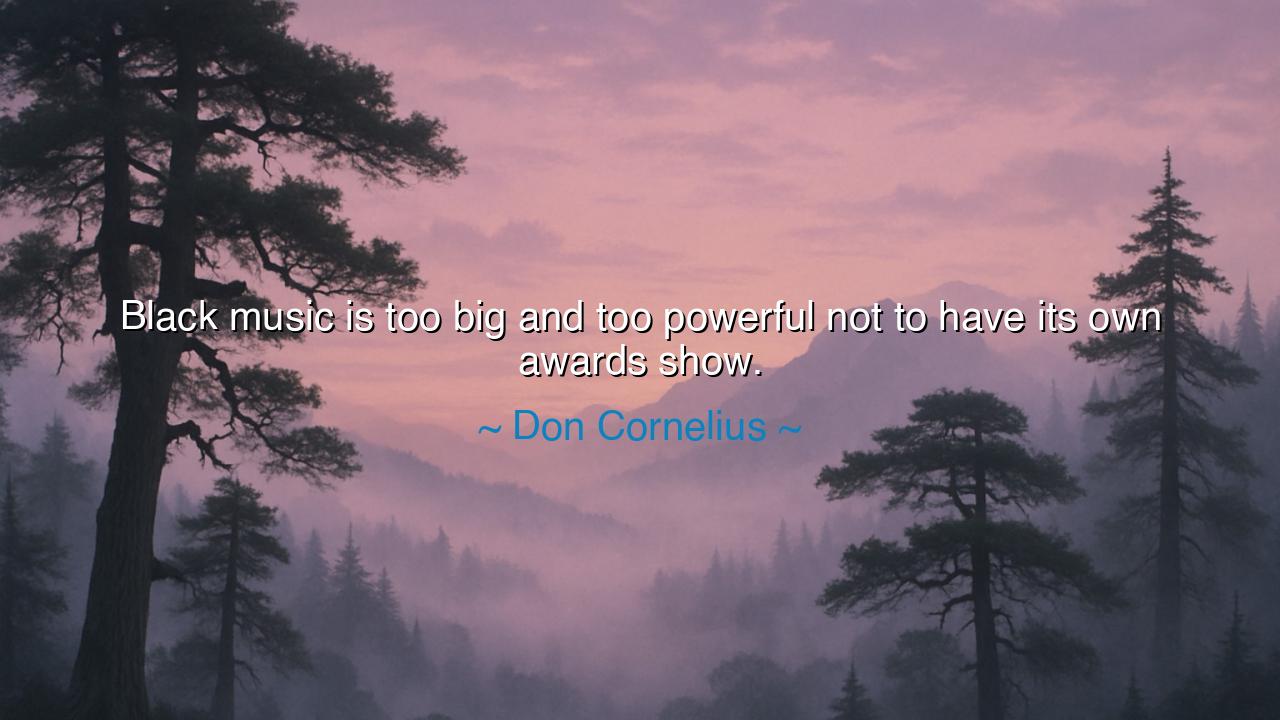
Black music is too big and too powerful not to have its own






Don Cornelius once declared: “Black music is too big and too powerful not to have its own awards show.” These words rise like a trumpet blast across the ages. They are not merely about music, but about dignity, recognition, and the honoring of a people’s creative spirit. For Cornelius, founder of Soul Train, understood that music is not only melody—it is memory, struggle, triumph, and the breath of a culture. Black music, born of pain and joy, forged in chains and freedom, had grown into a force so immense that no walls of silence, no gates of exclusion, could contain it.
The ancients spoke often of the sacredness of song. In Egypt, hymns were carved upon stone; in Greece, poets were honored almost as prophets; in Africa, drums carried history from village to village. Music has always been the lifeblood of a people, the pulse of identity itself. Thus Cornelius’s declaration holds ancient weight: when a people’s music grows big enough to shake the world and powerful enough to shape generations, it demands recognition. It cannot be hidden within the shadows of others’ stages; it must have its own altar, its own hall of honor.
Consider the legacy of Motown Records, where Berry Gordy created a platform for Black artists whose voices transformed the soundscape of the twentieth century. From Stevie Wonder to Diana Ross, from Marvin Gaye to The Temptations, their songs crossed borders of race and culture, teaching the world to dance, to weep, to love. Yet for too long, these artists faced exclusion, their brilliance overlooked or diminished on mainstream stages. It was in this climate that Cornelius spoke, insisting that Black music must not only be heard, but celebrated on its own terms, in its own right.
The birth of the Soul Train Music Awards became not merely an event, but a vindication. It was a throne built for the kings and queens of rhythm, soul, jazz, funk, R&B, hip-hop, and beyond. It said to the world: here is a music too vast to be ignored, too sacred to be borrowed without honor. Here is a powerful heritage, an art form woven into the very spirit of humanity. Cornelius’s vision was both revolutionary and restorative—it returned dignity where it had been denied.
The meaning of this is profound: recognition is not vanity—it is justice. To celebrate Black music is to acknowledge the centuries of genius that flowed from fields of labor, from gospel choirs, from jazz clubs and street corners, from pain transformed into poetry and rhythm. It is to declare that such music is not small, not secondary, but big and universal, a gift to all humanity. Cornelius’s words remind us that greatness must never be hidden; it must be lifted high, so generations may see it, hear it, and know its source.
The lesson is this: when something is powerful, it must be honored. When a people create, their creations must not be stolen or silenced, but celebrated. The same truth holds in every life—your gifts, too, must not be buried or diminished. Stand firm in their value, proclaim their worth, and ensure they have their rightful place in the world. For to hide power is to dishonor it; but to lift it up is to let it inspire others.
Therefore, let us act. Support the music, the art, the voices that emerge from every culture, especially those once silenced. Speak the names of the pioneers. Share their work. Demand spaces where their power can be fully honored. And in your own life, when you see your gift as too small, remember Cornelius’s teaching: if it is true, if it is powerful, then it deserves recognition. Do not wait for others to validate it—create your own stage, your own celebration.
Thus Don Cornelius’s words remain timeless: Black music is too big and too powerful not to have its own awards show. And beyond music, the truth resounds in all human endeavor—what is powerful must never be silenced. It must be honored, lifted, and remembered, for in its light, all people see more clearly the beauty and strength of the human soul.






AAdministratorAdministrator
Welcome, honored guests. Please leave a comment, we will respond soon